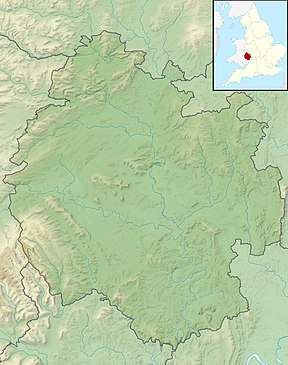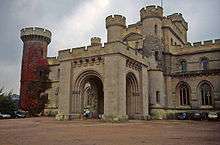Eastnor Castle
Eastnor Castle, Eastnor, Herefordshire is a 19th-century mock castle. Eastnor was built for John Cocks, 1st Earl Somers, who employed Robert Smirke, who was later to work at the British Museum, as his architect. The castle was built between 1811-1820. Major schemes of interior decoration were carried out by A.W.N. Pugin in 1849-1850. Eastnor remains a private home, and is currently the residence of James Hervey-Bathurst, the grandson of Arthur Somers-Cocks, 6th Baron Somers. The castle is a Grade I listed building.
| Eastnor Castle | |
|---|---|
 | |
| Type | Mock castle |
| Location | Eastnor, Herefordshire |
| Coordinates | 52.0297°N 2.3877°W |
| Built | 1811-1820 |
| Architect | Robert Smirke |
| Architectural style(s) | Gothic Revival |
| Governing body | Privately owned |
Listed Building – Grade I | |
| Official name: Eastnor Castle | |
| Designated | 18 November 1952 |
| Reference no. | 1156712 |
Listed Building – Grade II | |
| Official name: Castle lodge and gates | |
| Designated | 10 January 1986 |
| Reference no. | 1156692 |
Listed Building – Grade II | |
| Official name: Portcullis lodge and retaining walls to the forecourt of Eastnor Castle | |
| Designated | 10 January 1986 |
| Reference no. | 1082629 |
Listed Building – Grade II | |
| Official name: Retaining wall to Lower Terrace on garden front of Eastnor Castle | |
| Designated | 10 January 1986 |
| Reference no. | 1082630 |
Listed Building – Grade II | |
| Official name: Retaining wall to Upper Terrace on garden front of Eastnor Castle | |
| Designated | 10 January 1986 |
| Reference no. | 1349512 |
 Location of Eastnor Castle in Herefordshire | |
History
The estate was established in the late 16th century when the Cocks family purchased land in the area. Subsequent marriages into the Somers and Nash families helped provide the wealth and substance necessary to build the present imposing building, designed to look like one of the medieval castles guarding the Welsh borders.
The castle was built to the designs of Robert Smirke in 1812-20. A.W.N. Pugin made some internal alterations - including the decoration of the Gothic Drawing Room - in 1849-50, and George E Fox made more changes in the 1860s. It is constructed of ashlar stonework, with a lead and slate roof concealed behind an embattled parapet. Cast-iron was used for the roof trusses and floor beams.[1] It was constructed at a cost of £85,000,[2] the equivalent of approximately £26 million to £28 million at 2007 prices.
The castle was criticised by Charles Locke Eastlake later in the 19th century:
It is a massive and gloomy-looking building, flanked by watch-towers, and enclosing a keep. To preserve the character at which it aimed, the windows were made exceedingly small and narrow. This must have resulted in much inconvenience within...The building in question might have made a tolerable fort before the invention of gunpowder, but as a residence it was a picturesque mistake.[3]
Media appearances and events

The car manufacturer, Land Rover, uses the Eastnor estate as a vehicle test track and experience site.[4] The castle has been used as a set location for films, television programmes and music videos including; One More Time, starring Peter Lawford and Sammy Davis, Jr, Slade's video "Run Runaway", the 1986 film adaptation of Oscar Wilde's The Canterville Ghost,[5] the BBC TV adaptation of Little Lord Fauntleroy in 1995, the American reality competition television program, The Amazing Race,[6], ITV's 2015 adaptation of Doctor Thorne,[7] and two episodes of HBO's Succession.[8]
Citations
- Historic England. "Eastnor Castle (Grade 1) (1156712)". National Heritage List for England. Retrieved 1 May 2020.
- Brooks & Pevsner 2012, pp. 219-221.
- Eastlake 2012, p. 79.
- https://www.eastnor.landroverexperience.co.uk/
- "The Canterville Ghost (TV 1987)". IMDb. Retrieved 3 November 2011.
- ""Amazing Race:" 11 Teams Storm Castle Battlements". CBS News. 27 September 2011. Retrieved 1 January 2020.
- https://www.radiotimes.com/travel/2016-10-12/doctor-thorne-visit-the-real-greshamsbury-park-west-wycombe-house-in-buckinghamshire/
- "When Succession Filmed at Eastnor Castle". Eastnor Castle. 8 January 2020. Retrieved 2 May 2020.
Sources
- Brooks, Alan; Pevsner, Nikolaus (2012). Herefordshire. The Buildings of England. New Haven, US and London: Yale University Press. ISBN 978-0-300-12575-7.
- Eastlake, Charles Locke (2012) [1872]. A History Of The Gothic Revival. Cambridge: Cambridge University Press. ISBN 978-1-108-05191-0.
External links
| Wikimedia Commons has media related to Eastnor Castle. |
- Eastnor Castle - Wedding venue and corporate entertainment centre.
- Photos of Eastnor at Flickr